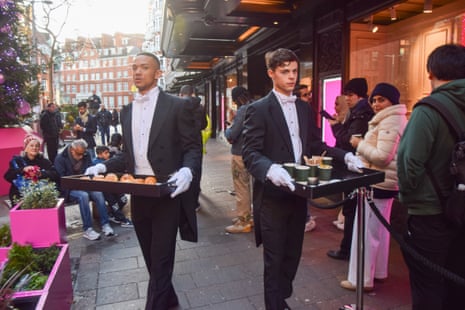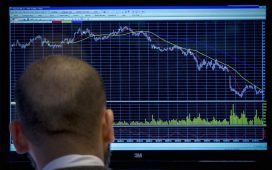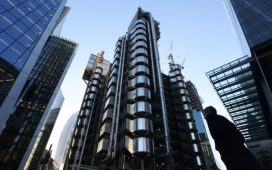New York Times sues Microsoft and OpenAI
The New York Times has announced it is suing artificial intelligence pioneer OpenAI, which developed ChatGPT, and major investor Microsoft over AI’s use of copyrighted work.
A lawsuit filed by the NYT claims that millions of articles from The New York Times were used, without permission, to create AI products.
The Times is seeking damages, in addition to asking the court to stop the tech companies from using its content and to destroy data sets that include the Times’ work.
In its complaint, the NYT says:
“Times journalism is the work of thousands of journalists, whose employment costs hundreds of millions of dollars per year.
Defendants have effectively avoided spending the billions of dollars that The Times invested in creating that work by taking it without permission or compensation.”
Key events
The US S&P 500 share index is inching towards a new alltime high.
In early trading, the benchmark stock index is up 3.36 points or almost 0.1% at 4,778.11, approaching the record high of 4796.56 points set in January 2022.
Shares in Microsoft have dipped very slightly in early Wall Street trading.
They’re down 0.2% at $373.87, having hit record highs this year due to excitement around AI.
The NYT’s lawsuit against OpenAI and Microsoft will touch on the crucial question of whether content available on the internet can be used to train artificial intelligence systems under the “fair use” legal provision.
Tech companies building generative-AI tools have generally argued that “fair use” covers their use of material on the web to develop systems such as large language models (LLMs)
In its suit, the Times said the fair use argument shouldn’t apply, because the AI tools can serve up, almost verbatim, large chunks of text from Times news articles.
The lawsuit says:
Publicly, Defendants insist that their conduct is protected as “fair use” because their unlicensed use of copyrighted content to train GenAI models serves a new “transformative” purpose.
But there is nothing “transformative” about using The Times’s content without payment to create products that substitute for The Times and steal audiences away from it.
Because the outputs of Defendants’ GenAI models compete with and closely mimic the inputs used to train them, copying Times works for that purpose is not fair use.
The Wall Street Journal writes that the legal landscape surrounding generative-AI is “unsettled”, with the technology still in its early days, adding:
There are other lawsuits that could test the rights of AI companies to “scrape” content from the web to train AI tools, including one by several prominent book authors against OpenAI.
In February, Getty Images sued the AI art company Stability AI in Delaware, alleging that it had infringed on Getty’s copyrights. Stability AI at the time said it doesn’t comment on pending litigation.
The New York Times has asked for a jury trial in the suit, which was filed in U.S. federal court in the Southern District of New York (and can be seen here).
It reports;
The Times is the first major American media organization to sue the companies, the creators of ChatGPT and other popular A.I. platforms, over copyright issues associated with its written works.
The lawsuit, filed in Federal District Court in Manhattan, contends that millions of articles published by The Times were used to train automated chatbots that now compete with the news outlet as a source of reliable information.
New York Times sues Microsoft and OpenAI
The New York Times has announced it is suing artificial intelligence pioneer OpenAI, which developed ChatGPT, and major investor Microsoft over AI’s use of copyrighted work.
A lawsuit filed by the NYT claims that millions of articles from The New York Times were used, without permission, to create AI products.
The Times is seeking damages, in addition to asking the court to stop the tech companies from using its content and to destroy data sets that include the Times’ work.
In its complaint, the NYT says:
“Times journalism is the work of thousands of journalists, whose employment costs hundreds of millions of dollars per year.
Defendants have effectively avoided spending the billions of dollars that The Times invested in creating that work by taking it without permission or compensation.”
The announcement of a budget on 6 March “looks like a last throw of the dice by a flailing Conservative government”, says Liberal Democrat Treasury spokeswoman Sarah Olney.
Olney adds:
“It’s too late for Jeremy Hunt to turn the tide after his record of failure has left us with growth flat-lining and public services at breaking point. People will never forgive the Conservative Party for crashing the economy, wrecking the NHS and clobbering families with years of unfair tax hikes.
“The only way to repair the damage done by the Conservatives is to kick them out of office through a general election.”
Shadow financial secretary to the Treasury James Murray has said it’s too late for the goevrnment to fix the damage caused to the UK economy:
“The next Budget will come after 14 years of economic failure under the Conservatives that have left working people worse off.
“The tax burden is set to be the highest in 70 years, with 25 Tory tax rises since the last election alone, and economic growth is on the floor. Nothing Rishi Sunak and Jeremy Hunt do in March can repair the damage they have done to our economy.
Just in: There were more customers in the shops this Boxing Day than a year ago, so ignore what we published this morning (see earlier post).
Data provider MRI Software has just reported that footfall levels were 4% higher than in 2022 yesterday, boosted by high streets and Central London. Initially they reported this morning that footfall fell by a fifth – which is being blamed on ‘technical issues’.
This is relief for retailers, although footfall was still almost 15% lower than before the pandemic.
MRI Software say:
-
Full day results show that footfall on Boxing Day rose year on year by +4% across all UK retail destinations, largely driven by high streets (+8.8%)
-
Week on week, footfall was -33% lower across all destination types
-
Shopping centres and retail parks declined by -34.9% and -47.5% from the same day in the week before
-
Central London experienced an increase in footfall by +10.6% from 2022, and +1.6% from 2019
-
Compared to 2019 levels, footfall remains -14.9% lower
Kate Nicholls, the head of UK Hospitality, says the trade body will work on a “detailed submission on measures to support hospitality” to feed into the chancellor’s plans for the budget.
The spring budget is seen by Downing Street as “a crucial milestone” in the run-up to a general election expected next year, with tax cuts widely expected, points out the Financial Times.

Richard Partington
Jeremy Hunt’s decision to announce 6 March as the date for a spring budget will fuel speculation over the timing of the next general election despite the Conservatives trailing in the opinion polls, my colleague Richard Partington reports.
He adds:
Labour’s lead over the Conservatives is at 13 points, according to the latest Opinium poll for the Observer.
Chancellor Jeremy Hunt will announce the UK’s next budget on March 6, giving the governing Conservatives what’s likely their last opportunity to announce giveaways before a general election https://t.co/DnuS8jtlKK
— Bloomberg Markets (@markets) December 27, 2023
The budget is likely to be Jeremy Hunt’s “last major chance to prepare the ground” ahead of the next election, says Reuters, adding:
The budget statement will include the government’s tax and spending plans as well as new growth and borrowing forecasts and government debt issuance for the 2024/25 financial year.
Spring Budget 2024 date confirmed
Newsflash: the Spring Budget 2024 will be delivered on 6 March, the UK government has just announced.
The Treasury says:
The Chancellor Jeremy Hunt has commissioned the Office for Budget Responsibility to prepare an economic and fiscal forecast to be presented to Parliament alongside his Spring Budget on 6 March 2024.
This should be the final budget before the next election, which must take place by January 2025.
And there will be pressure on Hunt to deliver some pre-election giveaways to shore up support for the Conservatives, who are lagging well behind in the polls.
The Daily Telegraph today reports that Downing Street is considering axing inheritance tax in three months’ time in a pre-election giveaway, in an attmpt to boost Rishi Sunak’s chances of victory.
They say the PM has ordered a “gear change” on tax.
While The Times today reports that “Worried Tories” will promise help for first-time buyers, which could include backing long fixed-term mortgages to cut deposits.
The i, meanwhile, report that Sunak and Hunt are plotting a spending trap for Labour by dictating the amount of money available for public services before the next election.
World stocks at highest in over a year as rate cut hopes hold firm
World stocks have rallied to their highest levels since late 2022 today, Reuters flags.
Year-end optimism high on hopes that major central banks such as the U.S. Federal Reserve will start cutting interest rates early next year.
MSCI’s world stock index has touched a more than one-year high and is up 4.5% in December.
MSCI’s broadest index of Asia-Pacific shares outside Japan has gained more than 1% to an over four-month high.
SEB chief economist Jens Magnusson says:
“We still have strong equity markets and that is likely to hold through to New Year,”

UPDATE: This post now inaccurate due to updated footfall data….
Yesterday was a disappointing Boxing Day for UK retailers, new figures indicate.
MRI Software has reported that footfall at the UK’s retail destinations was more than a fifth (22.1%) lower this Boxing Day than a year ago.
The day had started better, with footfall 2.3% higher than last year by 3pm, but across the full day shoppers dropped off significantly compared to 2022.
The rise earlier in the day had been driven by a 6.5% increase in high street visitors, MRI Software said.
The only town to experience a rise compared to last year was central London, where footfall was 12.9% higher.
Week on week, footfall was 32.9% lower across all high street, retail park and shopping centre destinations.
Jenni Matthews, Marketing and Insights Director at MRI Software, says:
The footfall drop of -32.9% week on week across all destination types is not surprising given that last week consumers were finalising their festive shopping. The fact that compared to 2019 levels, footfall remains -33.8% indicates the long-term impacts of the continued rise of online shopping, as many consumers may have started their sale shopping on Christmas Day evening, and with Black Friday only a few weeks ago many will have grabbed their bargains back then.
We also can’t forget that many people may be tightening their purse strings given the cost of living status, or may still be spending time with their families on Boxing Day and not be heading out to stores and destinations until later in the week.












